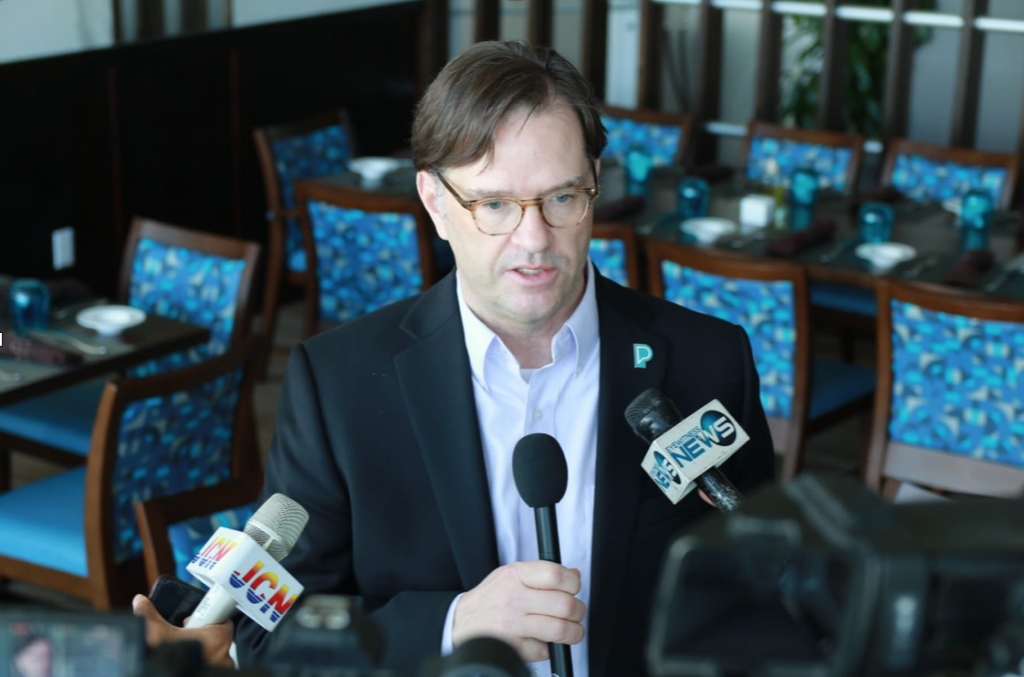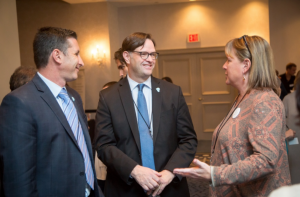Q&A With Parkinson’s Foundation CEO and President John L. Lehr

(Photo courtesy of the Parkinson's Foundation)
Despite economic challenges due to COVID-19 shutdowns, the Parkinson’s Foundation is investing $10 million toward research, its care network, and community grants, the CEO of the nonprofit has announced.
“As it turns out, our donors have really stayed with us,” said John L. Lehr, president and CEO of the foundation. “And I think that’s because they believe in the urgency of our mission to help people live better today with the disease and to invest in cutting edge research.”
The investment is part of Lehr’s vision to move the still relatively new Parkinson’s Foundation forward.
Lehr played a large role in merging the National Parkinson’s Foundation and the Parkinson’s Disease Foundation to establish the nonprofit in 2016. Since he took the helm in 2017, he has launched the PD GENEration study, which gathers genetic data on the disease population through free genetic testing, and expanded the Centers of Excellence Network — which provides care to Parkinson’s patients across the U.S. — to 47 sites.
Before joining the Parkinson’s Foundation, Lehr was president at Orr Group, a strategic fundraising firm. He has previously been CEO of CureSearch for Children’s Cancer and the Food Allergy Research and Education organization, and vice president of the Cystic Fibrosis Foundation.
In a Q&A with Parkinson’s News Today, Lehr breaks down where that $10 million will be invested, discusses promising new research, and explains how the foundation is improving its inclusion of minority groups.
Parkinson’s News Today: What have you learned from your past, especially at the large Cystic Fibrosis Foundation, that you are using to lead the Parkinson’s Foundation forward?
John Lehr: I came in and helped put together a national fundraising campaign that raised an additional $175 million over a five-year period that allowed the [Cystic Fibrosis] Foundation to continue its investment in therapeutics development. It was a great example of having a vision, executing on that vision, and bringing tremendous value to the community being served. If you’ve got a great team of program people, supported by an operations infrastructure, and you give them the juice to run, they can accomplish amazing things. And that’s really what happened at the CF Foundation.
Getting new and better therapies for people with Parkinson’s is really the priority. We’re still working with therapies, primarily dopamine replacement therapies, that were established several decades ago. And even though there are lots of new twists on that, getting at the underlying defect of Parkinson’s disease has remained elusive, in part, because it’s an incredibly complex disease. It’s not for lack of trying. It’s not for lack of progress. There’s been amazing progress. But really understanding the underlying cause and the basic biology of the disease is a fairly large task.
And that’s what the Parkinson Foundation was about — trying to put as much money into research as possible, while at the same time ensuring that people with Parkinson’s are getting the care they need to live well with this disease every day.
PNT: What funded the $10 million investment you recently announced?
Lehr: It’s coming exclusively from donors. The Parkinson’s Foundation has a fairly diverse revenue stream. Most of our donations come from individuals. What’s interesting about the $10 million this year was going into this year, coming out of the fiscal year 2020, we were going into COVID-19. And we really thought the foundation was going to take a significant hit like so many other organizations.
As it turned out, this fiscal year is running even better than last year, which was our best year ever. That $10 million was a surprise to us and a boon to our ability to invest in care research and patient education. So we were delighted to be able to do that. And we are really truly grateful to our donors for staying with us during what has been one of the most challenging periods in the modern era.
PNT: How does the PD GENEration study factor into making clinical research more effective and efficient?
Lehr: A number of pharmaceutical companies and biotech are developing therapies that are directly targeting the LRRK2 and the GBA mutation [two of the most common causes of Parkinson’s]. That’s a relatively new development. And the thinking here is that if you can target those mutations and make some changes in those mutations, you may be able to develop clinical therapies that benefit people with Parkinson’s. But in order to do that, you have to know who has those clinical mutations so that you can enroll them in clinical trials.
So our PD GENEration has got a couple of purposes. One is to identify people who have specific mutations so we can enroll them in upcoming clinical trials. Two, it’s to build a database so that, as we go along, we can do deep data analysis to see if we can find significant prognostic indicators or diagnostic indicators for people with Parkinson’s.
PNT: What research are you funding through your various programs? What looks the most promising to you?
Lehr: Impact Awards, which is one of our offerings, are awards of approximately $150,000. It allows researchers to explore an interesting idea, gather data, and then hopefully take that learning and apply for additional funding, whether it’s from the foundation or from the National Institutes of Health.
One Impact Award is looking at the PRKN mutation and saying, hey, there’s a downgrading of the mitochondria because of the PRKN mutation. But if you can replace an enzyme with a better copy of the enzyme, you may be able to rescue the mitochondrial function in the cell. That may then allow that cell to be a normal functioning cell and not one that leads to Parkinson’s.
Another study that we funded is in immunology. There’s a lot of questions like: Does Parkinson’s generate in the brain? Does it generate in the gut biome? The thought was maybe there’s something awry in the immune system. We funded [one researcher] to collect some additional data. This was about two or three years ago. Because of the success of his study, he’s gone on to get a K Award and the R01 Award, which is the big reward you get from the National Institutes of Health.
Those are two examples of people looking at Parkinson’s disease through a novel lens, where we gave them Impact Awards, and they were able to not only demonstrate that there was something to that hypothesis, they were able then to go on, have enough data and get additional funding to pursue it even further.
PNT: Clearly, there is a lot of focus on increasing diversity, especially in the PD GENEration testing. Why is that, and how does it help research?
Lehr: The Parkinson’s Foundation is dedicated to helping all people living with Parkinson’s no matter where they are and no matter what socioeconomic background. We want to help anybody who’s affected by Parkinson’s. Through the years, the Parkinson’s Foundation has developed a whole series of resources to help people. And what we often hear is, “After my diagnosis, I kind of was adrift. I didn’t know where to turn to, and then finally, somebody told me, oh, you should talk to the Parkinson’s Foundation.”
We can help in so many different ways through print material, digital materials, and our website, which has an abundance of podcasts and other informational material. We have a helpline, 1-800-4PD.INFO (1-800-473-4636), that anybody from anywhere in the world can call and get a trained Parkinson’s specialist on the other end of the line who can help guide them to services and resources that we have.
Studies tend to enroll people from European backgrounds. What we’d like to do is make sure that we’re enrolling people from other backgrounds, because those genetic variations can be very helpful in figuring out pathways to new therapy. So if you’re just working with one population, you’re going to be limited in your ability to do things. Having a much broader mix of people often leads to much, much better research.







